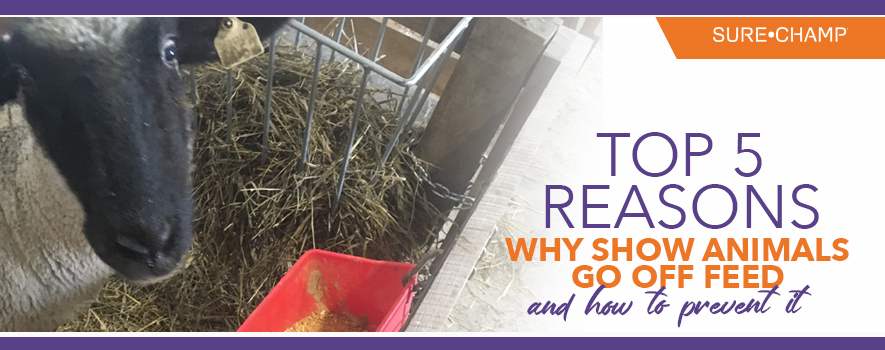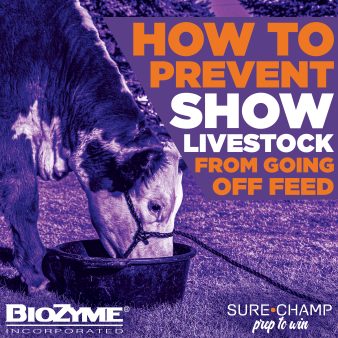
A lot of people change their eating habits with the seasons. Nothing is more satisfying on a cold winter day than a hot bowl of soup, but for most that doesn’t sound the least bit appetizing when the temperatures soar to 90-degrees and hotter, especially when you add in the humidity. We might prefer something lighter like a salad. Your show livestock are no different. Their appetites tend to decrease as the temperatures rise and you might find yourselves wondering why they go off feed so often in the summer months.
Kevin Glaubius, Director of Nutrition for BioZyme® Inc., suggests five reasons why show animals might go off feed in the hotter months and provides some tips for young feeders to make sure their animals stay on feed through summer’s heat.
- Seasonal Changes. One of the primary reasons animals will stop eating during the summer months is due to seasonal changes. The combination of daylight and sunshine can alter the animal’s desire to eat.</p>
- Temperature Rises. As the temperature rises, the animals are typically less active, which requires less overall energy. If they are expending less energy, their appetite will decrease because they don’t require the same amount of nutrients as they would if they were actively using energy. </p>
“Think about this. When we are hot, the last thing we want to do is eat a big meal. That has a lot to due with temperature triggers,” Glaubius said. “The temperature alters stress hormones in the animal and has an impact on metabolism and their overall appetite.”</p> - Environmental Changes. During the summer, we often haul our livestock to jackpots, progress shows, state previews, junior nationals, county fairs and state fairs. Sometimes these are weekly occurrences, and that hauling adds stress to the animal. Loading on the trailer and traveling 20 minutes to 20 hours takes its toll. Then, we stall or pen the livestock in unfamiliar barns with unfamiliar animals, sights, smells and sounds, and expect them to eat exactly what we put in their feed pan – sometimes more and sometimes different than what they had at home – to give them that added bloom and fill. This is stressful and will cause the animal to go off feed.</p>
- Diet Changes. Show animal diets are not a one-size-fits-all, and feeding is a science that takes precise calculation in the nutrition needed to meet a specific weight by the target endpoint. If you are making dietary changes, Glaubius reminds to transition slowly. If abrupt changes are made and the animal goes off feed, it will take just as long to get it back on feed as it would to make a gradual transition.</p>
- Summer Nuisances. Just like heat, length of days and hauling your stock causes stress, so do nuisances like flies and other pests and getting off a routine. Flies and other insects that buzz around the heads of your animals will cause a distraction away from eating.</p>
Keep those animals eating.
No one has time for show animals that go off feed, so take a proactive approach to keep your livestock eating all summer long. Animals are very routine-oriented, so set a feeding schedule and stick to it.
One of the best ways to make sure your livestock keep eating is to keep the digestive tract healthy, and a great way to do that is to include Amaferm® in your animals’ diets. Amaferm®️ is a prebiotic designed to enhance digestibility by amplifying the nutrient supply for maximum performance. It is research-proven to increase intake, digestion and absorption. All BioZyme® products including those in the Sure Champ® and Vita Charge® lines contain Amaferm, to help keep your animals eating.
Specific products that contain Amaferm that are designed to help drive your animals’ appetite during heat stress situations include Sure Champ Extreme with Climate Control and Vita Charge Climate Control Gel. The Amaferm helps increase intake and digestibility, driving consumption. With the increased efficiency in digestibility, the animal is using less energy to digest food, creating less internal heat. The Climate Control products also contain a plant extract specifically designed to maintain circulation, and promote water intake, therefore maintaining the body’s core temperature. They also contain garlic, to deter insects.
“Being aware of the factors that contribute to animals going off feed and including Amaferm can pay big dividends in the show ring,” Glaubius said.
Though we can’t control the seasons, length of day or the temperatures, we can do our best to mimic the consistency of them. Feed your animals at a consistent time each day, both morning and night. And, if that means feeding them in a darkened, cool barn with fans, then do it. Keeping your animals cool is important to maintaining their appetite throughout the summer.
The same goes for when you are traveling. Make sure to keep to their normal schedule as much as possible. Keep their feeding times consistent and keep their feed pans the same as they are at home. If they are accustomed to drinking from a tank or another water source other than a bucket, start bucket-watering them prior to going to the show, as water intake is vital to good health. Water intake is also highly correlated to feed intake.
When you do make feed changes, make them gradually. Yes, feed can change the appearance of an animal over time, but drastic changes too quickly can also lead to decreased appetites that can be detrimental to your feeding program.
Control flies. Be sure to use a fly spray around your barn and on your animals to keep them comfortable and to keep them eating.
Management and nutrition are the keys to keeping our show animals eating during the summer, right on up to the backdrop. Keep your show animals cool, hydrated, on a routine and give them the Amaferm advantage, and you’ll find them eating even on those days you’re not even hungry.

